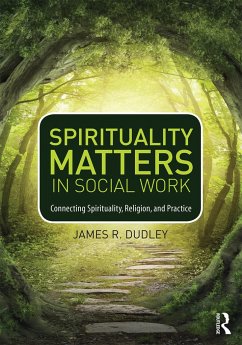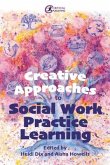James Dudley (University of North Carolina, Charlotte, USA)
Spirituality Matters in Social Work
Connecting Spirituality, Religion, and Practice
James Dudley (University of North Carolina, Charlotte, USA)
Spirituality Matters in Social Work
Connecting Spirituality, Religion, and Practice
- Broschiertes Buch
- Merkliste
- Auf die Merkliste
- Bewerten Bewerten
- Teilen
- Produkt teilen
- Produkterinnerung
- Produkterinnerung
Offering a focus that is lacking (or not clearly evident) in most spirituality books, Dudley addresses specific ways of incorporating spirituality into practice and integrates many of the contributions of other writers into an overall eclectic practice approach. His approach revolves around many of the core competencies of the EPAS accreditation (CSWE, 2008).
Andere Kunden interessierten sich auch für
![The Practice of Generalist Social Work The Practice of Generalist Social Work]() Marla Berg-Weger (USA Saint Louis University)The Practice of Generalist Social Work121,99 €
Marla Berg-Weger (USA Saint Louis University)The Practice of Generalist Social Work121,99 €![Decolonising and Reframing Critical Social Work Decolonising and Reframing Critical Social Work]() Sophie GoldingayDecolonising and Reframing Critical Social Work57,99 €
Sophie GoldingayDecolonising and Reframing Critical Social Work57,99 €![Research for Effective Social Work Practice Research for Effective Social Work Practice]() Judy L. Krysik (USA Arizona State University)Research for Effective Social Work Practice127,99 €
Judy L. Krysik (USA Arizona State University)Research for Effective Social Work Practice127,99 €![Inequality in U.S. Social Policy Inequality in U.S. Social Policy]() Bryan Warde (USA Lehman College)Inequality in U.S. Social Policy101,99 €
Bryan Warde (USA Lehman College)Inequality in U.S. Social Policy101,99 €![Practice Skills in Social Work and Welfare Practice Skills in Social Work and Welfare]() Practice Skills in Social Work and Welfare49,99 €
Practice Skills in Social Work and Welfare49,99 €![Making sense of theory and its application to social work practice Making sense of theory and its application to social work practice]() Phil MussonMaking sense of theory and its application to social work practice36,99 €
Phil MussonMaking sense of theory and its application to social work practice36,99 €![Creative Approaches to Social Work Practice Learning Creative Approaches to Social Work Practice Learning]() Creative Approaches to Social Work Practice Learning42,99 €
Creative Approaches to Social Work Practice Learning42,99 €-
-
-
Offering a focus that is lacking (or not clearly evident) in most spirituality books, Dudley addresses specific ways of incorporating spirituality into practice and integrates many of the contributions of other writers into an overall eclectic practice approach. His approach revolves around many of the core competencies of the EPAS accreditation (CSWE, 2008).
Produktdetails
- Produktdetails
- Verlag: Taylor & Francis Ltd
- Seitenzahl: 382
- Erscheinungstermin: 25. Februar 2016
- Englisch
- Abmessung: 254mm x 178mm x 21mm
- Gewicht: 718g
- ISBN-13: 9780415747042
- ISBN-10: 041574704X
- Artikelnr.: 43017144
- Herstellerkennzeichnung
- Libri GmbH
- Europaallee 1
- 36244 Bad Hersfeld
- gpsr@libri.de
- Verlag: Taylor & Francis Ltd
- Seitenzahl: 382
- Erscheinungstermin: 25. Februar 2016
- Englisch
- Abmessung: 254mm x 178mm x 21mm
- Gewicht: 718g
- ISBN-13: 9780415747042
- ISBN-10: 041574704X
- Artikelnr.: 43017144
- Herstellerkennzeichnung
- Libri GmbH
- Europaallee 1
- 36244 Bad Hersfeld
- gpsr@libri.de
James (Jim) Dudley has been involved in spirituality activities and their role in social work practice for many years. Besides teaching numerous Spirituality and Social Work courses at the University of North Carolina at Charlotte, he has also conducted research and published on the topic, as well as led several retreats and workshops. He has a Master's Degree in Spirituality Studies and has completed training in spiritual direction. He also has an MSW Degree and Ph.D. in Social Work and is a Licensed Clinical Social Worker in North Carolina.
Table of Contents Overview of Spirituality and Social Work Overview of the
changing landscape of religions in the United States Comparing social
workers and the public on religiosity Implications of "being where the
client is." Spirituality and religion introduced and distinguished Social
work's rediscovering of spirituality Numerous meanings associated with
spirituality Spirituality as a macro and micro concept Introduction to a
set of spiritual competencies Affirming Our Own Spirituality Stress
reduction, self-care, and spiritually Embracing mindfulness Reflecting on
our motives for becoming social workers Expressing our spirituality in the
helping role Stages of spiritual and faith development Addressing personal
ethical dilemmas and conflicts Political correctness about spirituality
Understanding the Spirituality of our Clients A vast array of spiritual and
religious backgrounds How can we be informed about so many groups? A
framework for finding out the basics Developing an ecumenical perspective
and spirit Delving more deeply into the backgrounds of our clients
Diversity and the Spirituality of our Clients Taking seriously the
spirituality of children and youth Keen interest of older adults in
spirituality Recent immigrants and spirituality Working with Latinos in the
Pentecostal and Catholic Traditions Working with Islamic Clients Working
with Hindu Clients The Ethics of Being Client-Centered Spirituality and the
NASW Code of Ethics Spirituality and Social Work Accreditation Encounters
with different kinds of ethical problems Reproductive rights and abortion
LGBT issues Death penalty Domestic relationships and violence Christian
Privilege in the United States Preparing for Client Contact in a
Spiritually-Sensitive Ways Finding prior quiet time Tuning into our deeper
spiritual self with Mindfulness Tuning into the client's spiritual issues
The Zen of helping perspective Initial ethical cautions Step One: Initial
Engagement of Spiritual Issues Bringing spirituality into initial
discussions Forging a spiritually-sensitive relationship Personal obstacles
to deeper explorations Deeper exploration in engagement Step Two: Assessing
Spiritual Issues What are we trying to assess? Non-religious spiritual
assessments Religious spiritual assessments Assessment with special groups
of clients Step Three: Introducing Spiritual Interventions A broad range of
spiritual interventions How we can use some of these interventions Step
Three: Integrating Spirituality into Other Approaches Person-Centered
approach Cognitive Behavioral approach DBT and Mindfulness Meditation
Narrative Approach Solution-focused Existential Step Four: Evaluating
Spiritual Progress Periodic explorations Client's satisfaction inquiries
Assessing progress on the client's spiritual development Strategies for
establishing evidence-based practice The Future for Spirituality and Social
Work Preparing for a future of even greater diversity in the population
Challenges ahead for social work and other helping professions Addressing
the ongoing resistance to inclusion of spirituality into professional
education Recommendations for social work education in meeting the
challenges of the future
changing landscape of religions in the United States Comparing social
workers and the public on religiosity Implications of "being where the
client is." Spirituality and religion introduced and distinguished Social
work's rediscovering of spirituality Numerous meanings associated with
spirituality Spirituality as a macro and micro concept Introduction to a
set of spiritual competencies Affirming Our Own Spirituality Stress
reduction, self-care, and spiritually Embracing mindfulness Reflecting on
our motives for becoming social workers Expressing our spirituality in the
helping role Stages of spiritual and faith development Addressing personal
ethical dilemmas and conflicts Political correctness about spirituality
Understanding the Spirituality of our Clients A vast array of spiritual and
religious backgrounds How can we be informed about so many groups? A
framework for finding out the basics Developing an ecumenical perspective
and spirit Delving more deeply into the backgrounds of our clients
Diversity and the Spirituality of our Clients Taking seriously the
spirituality of children and youth Keen interest of older adults in
spirituality Recent immigrants and spirituality Working with Latinos in the
Pentecostal and Catholic Traditions Working with Islamic Clients Working
with Hindu Clients The Ethics of Being Client-Centered Spirituality and the
NASW Code of Ethics Spirituality and Social Work Accreditation Encounters
with different kinds of ethical problems Reproductive rights and abortion
LGBT issues Death penalty Domestic relationships and violence Christian
Privilege in the United States Preparing for Client Contact in a
Spiritually-Sensitive Ways Finding prior quiet time Tuning into our deeper
spiritual self with Mindfulness Tuning into the client's spiritual issues
The Zen of helping perspective Initial ethical cautions Step One: Initial
Engagement of Spiritual Issues Bringing spirituality into initial
discussions Forging a spiritually-sensitive relationship Personal obstacles
to deeper explorations Deeper exploration in engagement Step Two: Assessing
Spiritual Issues What are we trying to assess? Non-religious spiritual
assessments Religious spiritual assessments Assessment with special groups
of clients Step Three: Introducing Spiritual Interventions A broad range of
spiritual interventions How we can use some of these interventions Step
Three: Integrating Spirituality into Other Approaches Person-Centered
approach Cognitive Behavioral approach DBT and Mindfulness Meditation
Narrative Approach Solution-focused Existential Step Four: Evaluating
Spiritual Progress Periodic explorations Client's satisfaction inquiries
Assessing progress on the client's spiritual development Strategies for
establishing evidence-based practice The Future for Spirituality and Social
Work Preparing for a future of even greater diversity in the population
Challenges ahead for social work and other helping professions Addressing
the ongoing resistance to inclusion of spirituality into professional
education Recommendations for social work education in meeting the
challenges of the future
Table of Contents Overview of Spirituality and Social Work Overview of the
changing landscape of religions in the United States Comparing social
workers and the public on religiosity Implications of "being where the
client is." Spirituality and religion introduced and distinguished Social
work's rediscovering of spirituality Numerous meanings associated with
spirituality Spirituality as a macro and micro concept Introduction to a
set of spiritual competencies Affirming Our Own Spirituality Stress
reduction, self-care, and spiritually Embracing mindfulness Reflecting on
our motives for becoming social workers Expressing our spirituality in the
helping role Stages of spiritual and faith development Addressing personal
ethical dilemmas and conflicts Political correctness about spirituality
Understanding the Spirituality of our Clients A vast array of spiritual and
religious backgrounds How can we be informed about so many groups? A
framework for finding out the basics Developing an ecumenical perspective
and spirit Delving more deeply into the backgrounds of our clients
Diversity and the Spirituality of our Clients Taking seriously the
spirituality of children and youth Keen interest of older adults in
spirituality Recent immigrants and spirituality Working with Latinos in the
Pentecostal and Catholic Traditions Working with Islamic Clients Working
with Hindu Clients The Ethics of Being Client-Centered Spirituality and the
NASW Code of Ethics Spirituality and Social Work Accreditation Encounters
with different kinds of ethical problems Reproductive rights and abortion
LGBT issues Death penalty Domestic relationships and violence Christian
Privilege in the United States Preparing for Client Contact in a
Spiritually-Sensitive Ways Finding prior quiet time Tuning into our deeper
spiritual self with Mindfulness Tuning into the client's spiritual issues
The Zen of helping perspective Initial ethical cautions Step One: Initial
Engagement of Spiritual Issues Bringing spirituality into initial
discussions Forging a spiritually-sensitive relationship Personal obstacles
to deeper explorations Deeper exploration in engagement Step Two: Assessing
Spiritual Issues What are we trying to assess? Non-religious spiritual
assessments Religious spiritual assessments Assessment with special groups
of clients Step Three: Introducing Spiritual Interventions A broad range of
spiritual interventions How we can use some of these interventions Step
Three: Integrating Spirituality into Other Approaches Person-Centered
approach Cognitive Behavioral approach DBT and Mindfulness Meditation
Narrative Approach Solution-focused Existential Step Four: Evaluating
Spiritual Progress Periodic explorations Client's satisfaction inquiries
Assessing progress on the client's spiritual development Strategies for
establishing evidence-based practice The Future for Spirituality and Social
Work Preparing for a future of even greater diversity in the population
Challenges ahead for social work and other helping professions Addressing
the ongoing resistance to inclusion of spirituality into professional
education Recommendations for social work education in meeting the
challenges of the future
changing landscape of religions in the United States Comparing social
workers and the public on religiosity Implications of "being where the
client is." Spirituality and religion introduced and distinguished Social
work's rediscovering of spirituality Numerous meanings associated with
spirituality Spirituality as a macro and micro concept Introduction to a
set of spiritual competencies Affirming Our Own Spirituality Stress
reduction, self-care, and spiritually Embracing mindfulness Reflecting on
our motives for becoming social workers Expressing our spirituality in the
helping role Stages of spiritual and faith development Addressing personal
ethical dilemmas and conflicts Political correctness about spirituality
Understanding the Spirituality of our Clients A vast array of spiritual and
religious backgrounds How can we be informed about so many groups? A
framework for finding out the basics Developing an ecumenical perspective
and spirit Delving more deeply into the backgrounds of our clients
Diversity and the Spirituality of our Clients Taking seriously the
spirituality of children and youth Keen interest of older adults in
spirituality Recent immigrants and spirituality Working with Latinos in the
Pentecostal and Catholic Traditions Working with Islamic Clients Working
with Hindu Clients The Ethics of Being Client-Centered Spirituality and the
NASW Code of Ethics Spirituality and Social Work Accreditation Encounters
with different kinds of ethical problems Reproductive rights and abortion
LGBT issues Death penalty Domestic relationships and violence Christian
Privilege in the United States Preparing for Client Contact in a
Spiritually-Sensitive Ways Finding prior quiet time Tuning into our deeper
spiritual self with Mindfulness Tuning into the client's spiritual issues
The Zen of helping perspective Initial ethical cautions Step One: Initial
Engagement of Spiritual Issues Bringing spirituality into initial
discussions Forging a spiritually-sensitive relationship Personal obstacles
to deeper explorations Deeper exploration in engagement Step Two: Assessing
Spiritual Issues What are we trying to assess? Non-religious spiritual
assessments Religious spiritual assessments Assessment with special groups
of clients Step Three: Introducing Spiritual Interventions A broad range of
spiritual interventions How we can use some of these interventions Step
Three: Integrating Spirituality into Other Approaches Person-Centered
approach Cognitive Behavioral approach DBT and Mindfulness Meditation
Narrative Approach Solution-focused Existential Step Four: Evaluating
Spiritual Progress Periodic explorations Client's satisfaction inquiries
Assessing progress on the client's spiritual development Strategies for
establishing evidence-based practice The Future for Spirituality and Social
Work Preparing for a future of even greater diversity in the population
Challenges ahead for social work and other helping professions Addressing
the ongoing resistance to inclusion of spirituality into professional
education Recommendations for social work education in meeting the
challenges of the future








